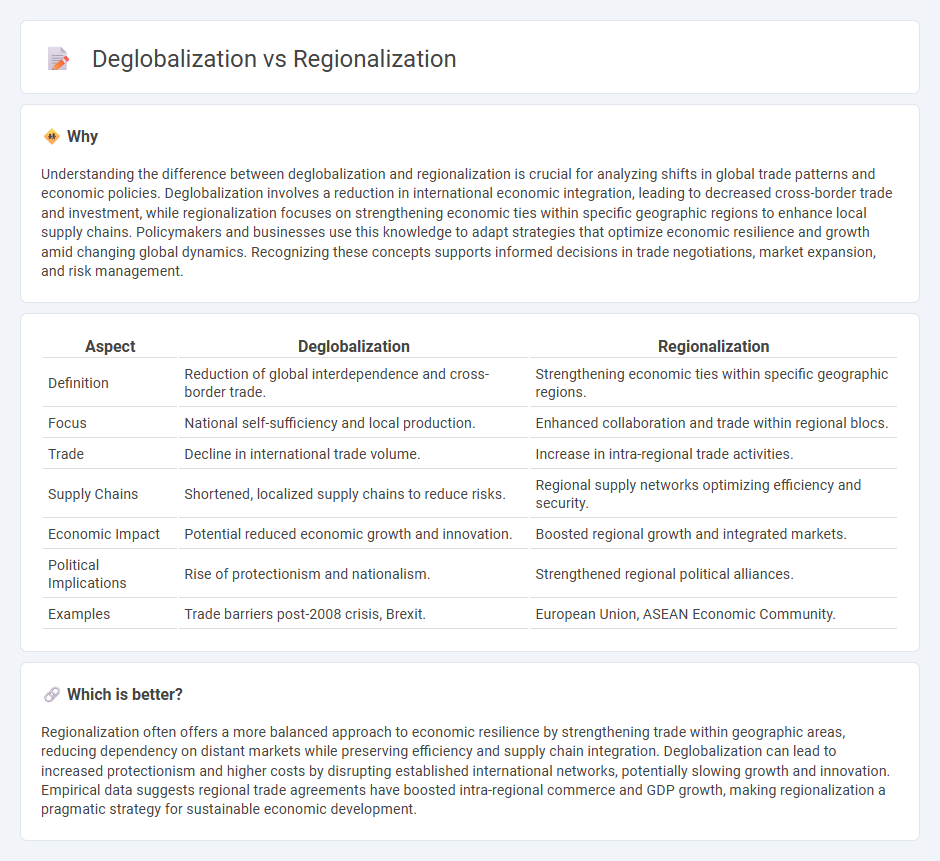
Deglobalization refers to the retreat from global interconnectedness, characterized by reduced international trade, investment, and economic integration. Regionalization emphasizes strengthening economic ties within specific geographic areas to create resilient supply chains and promote local markets. Explore the dynamics between these trends to understand their impact on global economic stability.
Why it is important
Understanding the difference between deglobalization and regionalization is crucial for analyzing shifts in global trade patterns and economic policies. Deglobalization involves a reduction in international economic integration, leading to decreased cross-border trade and investment, while regionalization focuses on strengthening economic ties within specific geographic regions to enhance local supply chains. Policymakers and businesses use this knowledge to adapt strategies that optimize economic resilience and growth amid changing global dynamics. Recognizing these concepts supports informed decisions in trade negotiations, market expansion, and risk management.
Comparison Table
| Aspect | Deglobalization | Regionalization |
|---|---|---|
| Definition | Reduction of global interdependence and cross-border trade. | Strengthening economic ties within specific geographic regions. |
| Focus | National self-sufficiency and local production. | Enhanced collaboration and trade within regional blocs. |
| Trade | Decline in international trade volume. | Increase in intra-regional trade activities. |
| Supply Chains | Shortened, localized supply chains to reduce risks. | Regional supply networks optimizing efficiency and security. |
| Economic Impact | Potential reduced economic growth and innovation. | Boosted regional growth and integrated markets. |
| Political Implications | Rise of protectionism and nationalism. | Strengthened regional political alliances. |
| Examples | Trade barriers post-2008 crisis, Brexit. | European Union, ASEAN Economic Community. |
Which is better?
Regionalization often offers a more balanced approach to economic resilience by strengthening trade within geographic areas, reducing dependency on distant markets while preserving efficiency and supply chain integration. Deglobalization can lead to increased protectionism and higher costs by disrupting established international networks, potentially slowing growth and innovation. Empirical data suggests regional trade agreements have boosted intra-regional commerce and GDP growth, making regionalization a pragmatic strategy for sustainable economic development.
Connection
Deglobalization and regionalization are interconnected as both involve a shift from global integration toward more localized economic frameworks, with regional trade agreements and supply chains gaining prominence as multinational corporations seek to reduce risks from global disruptions. Economic policies increasingly favor strengthening regional cooperation to enhance resilience, boost local industries, and secure strategic resources, which reflects a strategic response to geopolitical tensions and supply chain vulnerabilities. This transition impacts global trade flows, investment patterns, and economic growth dynamics by emphasizing regional economic clusters over broad global networks.
Key Terms
Supply Chains
Regionalization emphasizes restructuring supply chains to enhance local sourcing, reduce transportation costs, and improve resilience against global disruptions, thereby fostering closer economic integration within specific geographic areas. Deglobalization involves scaling back global supply networks, promoting national self-sufficiency, and limiting dependency on international suppliers to mitigate geopolitical and trade risks. Explore detailed insights on how these trends are reshaping global supply chain strategies.
Trade Barriers
Trade barriers rise with regionalization as countries form blocs like the European Union, enhancing internal trade through reduced tariffs but increasing external tariffs to protect regional markets. Deglobalization escalates trade restrictions globally, leading to widespread tariffs and non-tariff barriers aimed at safeguarding national industries and reducing dependence on international supply chains. Explore deeper insights into how trade policies evolve in response to shifting global economic dynamics.
Economic Integration
Economic integration enhances regionalization by fostering trade agreements, reducing tariffs, and encouraging cross-border investments within specific geographic areas. Deglobalization signifies a retreat from global economic interdependence, leading to increased protectionism, supply chain localization, and regional economic blocs. Explore how these dynamics shape global market strategies and economic policies.
Source and External Links
Regionalisation - Wikipedia - Regionalization is the tendency to form decentralized regions, observed in fields like agriculture, geography, politics, and linguistics, and can mean both the process of delineating regions and the resulting state of such division.
Benefits of Regionalization - Rural Community Assistance Partnership - Regionalization allows communities to pool resources, share costs, and improve access to services like water and wastewater, often leading to better financial management and infrastructure support for small or rural systems.
REGIONALIZATION definition | Cambridge English Dictionary - In economics and politics, regionalization refers to a process where a multi-country area becomes more economically or politically significant than the individual countries within it.
 dowidth.com
dowidth.com